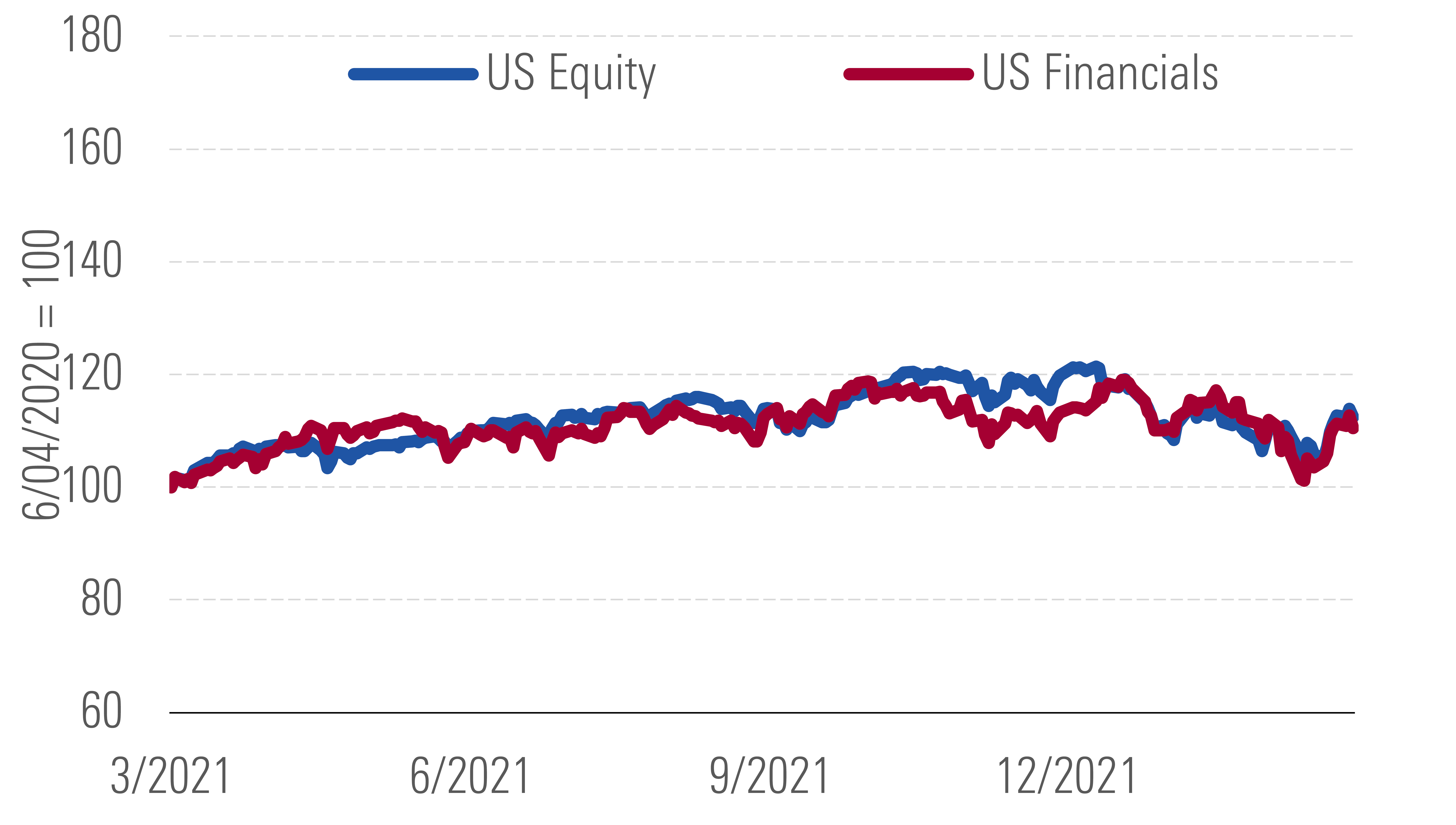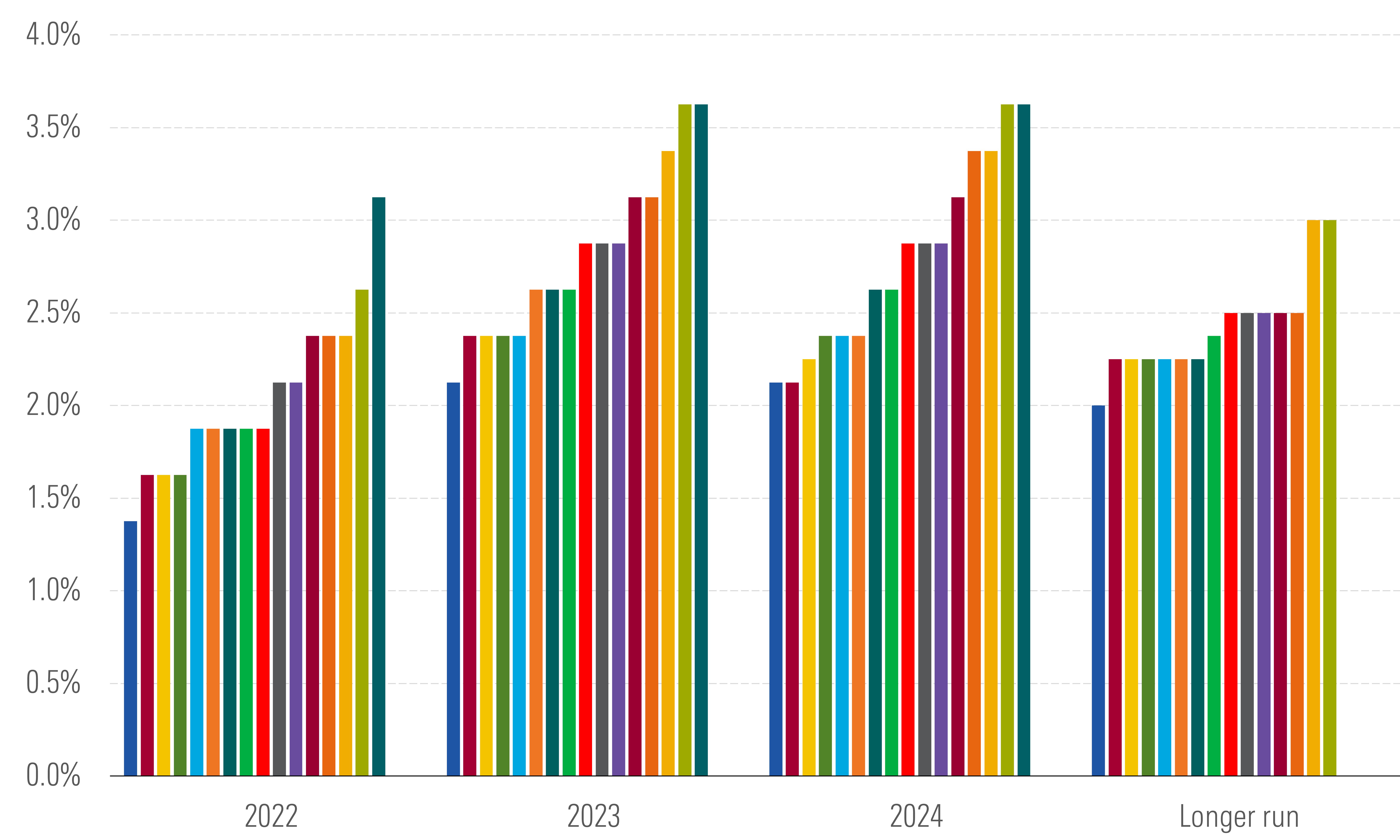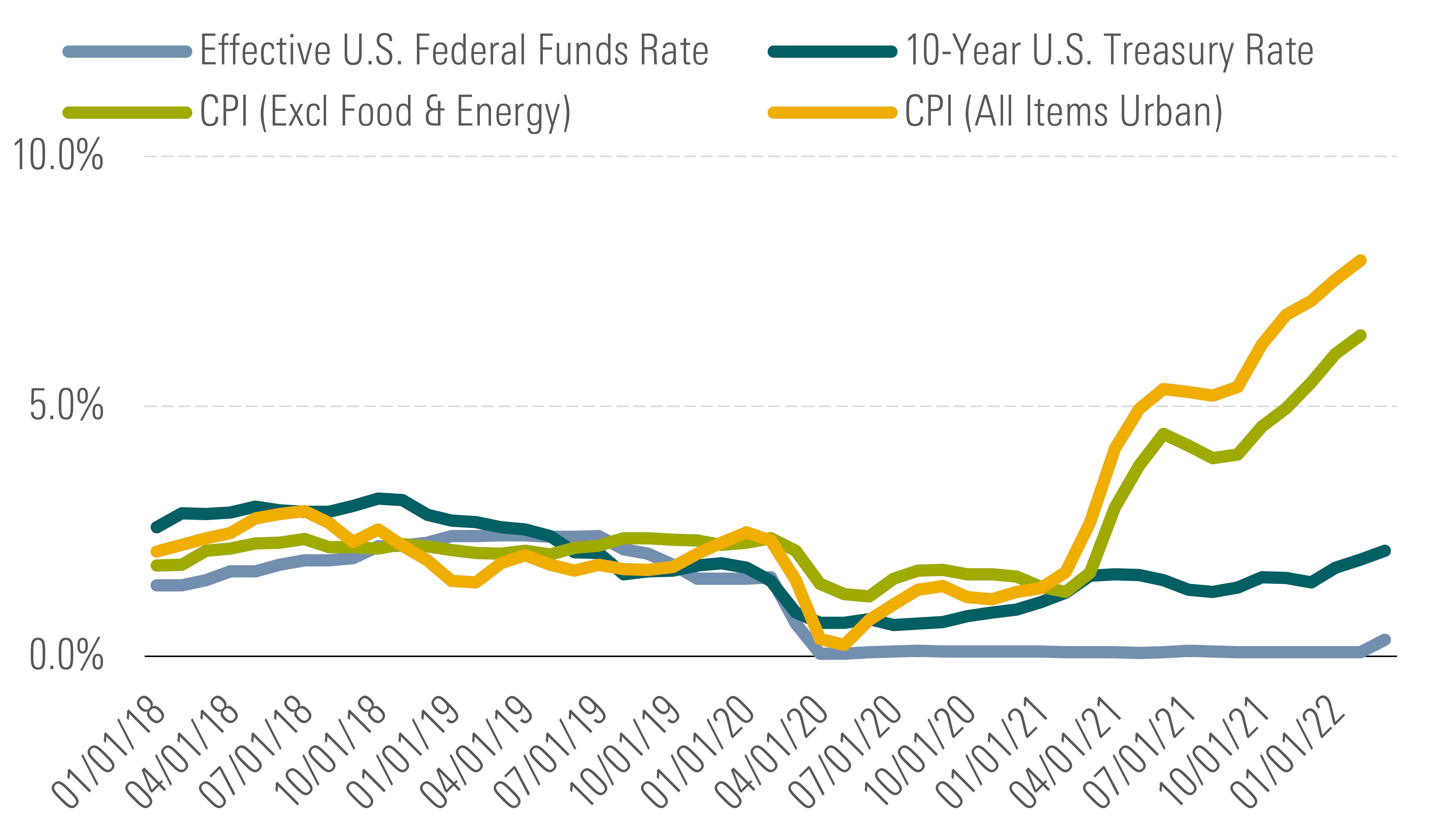Higher Interest Rates Could Lift Financials Stocks
Credit services and asset management are undervalued.
The Morningstar US Financial Services Sector Index underperformed the Morningstar US Market Index over the previous year, returning 12.61% compared with 14.43%, but outperformed in the previous quarter, down 0.89% compared with the market's decline of 5.16%.
Exhibit 1: Financials outperformed in the first quarter.

- source: Morningstar
The median North American financial sector stock trades at a 1% discount to its fair value estimate compared with about a 2% premium at the end of the fourth quarter of 2021. We currently rate about 28% of the North American financial sector stocks that we cover as undervalued 5- or 4-star stocks, with about 56% being rated fairly valued 3-star stocks and 16% rated overvalued 2- and 1-star stocks.
Exhibit 2: Financials are looking attractive. - source: Morningstar The relative outperformance of the financial sector recently is likely due to an increase in interest-rate expectations. At the end of 2021, the median Federal Open Market Committee member believed that three interest-rate hikes in 2022 to a range of 0.75%–1% would be appropriate. However, actions and expectations have dramatically shifted, with the FOMC increasing the federal-funds rate to 0.25%–0.50% in its March meeting, and the median FOMC member expecting the federal-funds rate to rise to 1.75%–2% by the end of 2022, according to the FOMC dot plot.
Exhibit 3: Federal-funds rate expected to rise to 1.75%–2% in 2022.

- source: Morningstar
Long-term interest rates have also increased, with the 10-year U.S. Treasury's yield increasing to over 2% from around 1.5% at the end of 2021. Higher interest rates are a positive driver of earnings across much of the financial sector from banks that charge more for loans to insurers that earn more on their investable float. The positive effect of higher interest rates on financials contrasts with many other sectors where higher interest rates increase their cost of funding or could limit their ability to finance new projects.
While there is much to be currently worried about in the world, the FOMC is focusing on reining in inflation. In February, core inflation was about 6.5% and inflation including energy and food was nearly 8%. While raising interest rates won't directly relieve some drivers of inflation, such as disruptions in oil supply, it could tamp down demand to bring the overall demand and supply of goods and services into a better balance. We don’t see an immediate recession risk for the U.S., but the European situation and progress toward a "soft landing" must be monitored.
Exhibit 4: Higher interest rates are being used to rein in inflation.

- source: Morningstar
Top Picks
BlackRock BLK Star Rating: ★★★★ Economic Moat Rating: Wide Fair Value Estimate: $1,000 Fair Value Uncertainty: Medium
BlackRock has traded off harder than other asset managers this year, but there's no fundamental reason for the company's performance to be trailing its peers'. The company is at its core a passive investor. Through its iShares exchange-traded fund platform and institutional index fund offerings, the wide-moat firm sources two thirds of its managed assets (and half its annual revenue) from passive products. In an environment where investors are seeking out passive products, as well as asset managers that have greater scale, established brands, solid long-term performance, and reasonable fees, BlackRock is well positioned.
Citigroup C Star Rating: ★★★★ Economic Moat Rating: None Fair Value Estimate: $79 Fair Value Uncertainty: Medium
Citigroup is the most undervalued traditional U.S. bank we cover and is trading below tangible book value. The bank is busy shedding nonperforming segments, refocusing its operations on core competencies and geographies, and is dealing with consent orders from regulators. Further, Citigroup is not one of the most rate-sensitive names, which we think contributes to its current lack of popularity. While the bank faces some headwinds, we think a recovery in card balances, in the U.S. and abroad, will help to drive revenue growth for the bank. We also think a resolution of consent orders should serve as a catalyst.
Fiserv FISV Star Rating: ★★★★ Economic Moat Rating: Wide Fair Value Estimate: $800 Fair Value Uncertainty: Medium
Like other payments companies, Fiserv benefits from the ongoing trend toward electronic payments. The market has recently soured on payment names generally, but we don't believe the fundamental long-term drivers have materially changed. In our view, Fiserv strikes the best balance between quality and value at the moment. As one of the leading acquirers, we believe the narrow-moat company benefits from a scale-based cost advantage, and its Clover product offers a solid engine for growth in the coming years and demonstrates management’s ability to adapt to an evolving industry.

/s3.amazonaws.com/arc-authors/morningstar/75bbf764-3b6f-4f5a-8675-8f9488c74c04.jpg)
/cloudfront-us-east-1.images.arcpublishing.com/morningstar/PLMEDIM3Z5AF7FI5MVLOQXYPMM.jpg)
/cloudfront-us-east-1.images.arcpublishing.com/morningstar/I53I52PGOBAHLOFRMZXFRK5HDA.jpg)
/cloudfront-us-east-1.images.arcpublishing.com/morningstar/CEWZOFDBCVCIPJZDCUJLTQLFXA.jpg)
:quality(80)/s3.amazonaws.com/arc-authors/morningstar/75bbf764-3b6f-4f5a-8675-8f9488c74c04.jpg)